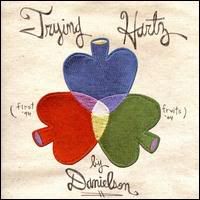10. Xiu Xiu - Women As LoversKill Rock Stars
When Women As Lovers was released, it was billed as the most accessible Xiu Xiu album yet. There are several reasons to support this assertion: one might be that every song is melodically-based, a departure from the frictive noise pieces that have appeared and sometimes defined the band's albums to date. You could also point to overtly accessible songs: the cover of
Under Pressure, with vocal duties split between the worldly Michael Gira, the enchantingly innocent-sounding Caralee McElroy and the manic homosexual street preacher style of Jamie Stewart himself.
No Friend Oh! with its pop chorus and non-difficult melodies is another example. However. However, however, however.
Who could be taken in by this idle talk? Women As Lovers might seem consumable, but it's not, and it's probably not meant to be. It is, as with everything from Jamie Stewart, concerned with the unbearable heaviness of existence. Torture in Guantanamo. His dead father's sex life. Intolerance. Percoset. Self-consciousness. Loneliness. In a voice that could be used to terrorise children into bed for fear of being cut into pieces and taken away in a black bag. This is heavily depressing stuff to listen to, and no doubt it's heavily depressing stuff to make.
But that's why Xiu Xiu exist. Seekers of happiness stroll no further. Women As Lovers is everything bad, set in high contrast on a stage with nightmarish gargoyles carved where the gold leaf and pegasi should bed. When it leaves itself room to seethe, like on
Master Of The Bump (Kurt Stambaugh I Can Feel The Soil Falling Over My Head), it evokes empathy. When it builds itself up in balls of tension, it calls forth a more inexplicable sense of sadness. But the emotion never ceases, like a bumpy rollercoaster that only goes down. Music as nightmare.
9. El Guincho - AlegranzaYoung Turks
It's a rare treat to be able to use words like "spectacular" or "extravaganza" about an album that is even remotely listenable. Imagine the joy, then, of finding Barcelona resident El Guincho's Alegranza. Straddling the hitherto underrated no-man's-land between latter-day Animal Collective and tropicalia compilations, Alegranza is essentially a beach party in a can, the soundtrack to an imaginary ur-summer. The result of applying lo-fi looping techniques to the cheesiest of musical sources is an unrelenting, swirling, euphoric experience. It is not mere reckelss abandon, however, with the same notes of childish wonder (and a couple of melodies) from Panda Bear's Person Pitch making appearances. The highlight,
Kalise, is repetitive almost to the point of infuriation for three and a half minutes, until it recedes without warning into a chorus that approaches anaesthesis in its fulfilled joyousness. Just like the inevitable but slightly embarrassing situation of involuntarily singing random words that sound vaguely like the original Spanish, any words I use to try to explain how much fun El Guincho is on a sunny day are meaningless. Alegranza means joy. In translation I mean. But you get what I'm saying.
((This is from Analogue. Last one from there, I promise.))
8. Jeremy Jay - A Place Where We Could GoK
Take the Everly Brothers. Strain off their smile for the benefit of Good Christian Television Viewers, and remove the harmonies. Put more reverb on everything. Then imagine what would happen if a very strange, soft-spoken Patrick Wolf-esque Californian in a v-neck and tie took the first verse of any classic song and just repeated the lines with more and more emphasis every time. There's something very ordinary about Jeremy Jay's music, referential as it is to 50s teen drama ballads, David Bowie, Buddy Holly, Jonathan Richman and French chanteuses. But there's also something spectacularly surreal about it. Maybe that's what an absence of audible influences from after 1972 will do.
Jeremy Jay is as tall and thin as a Topman model, and to be honest, he looks exactly like one. Jeremy Jay grew up in California but for some reason his family was Francophone within the household. Jeremy Jay is on K Records. Jeremy Jay seems like a cookie-cutter hyper-literate bohemian type, but a brief MySpace exchange revealed that he's not much of a speller. There's a lot that doesn't make sense about Jeremy Jay, and that's what makes him so impossibly intriguing. I mean, what is this guy picturing when he closes his eyes and listens to his own music? Much more pertinently, what should the listener be picturing?
The mystery of Jeremy Jay is a part of what endeared him to me. But he definitely doesn't lack the songs to back it up.
Beautiful Rebel and
Heavenly Creatures as a tandem would blow the shit out of most of the crackly remasters they sell in infomercials late at night on the lesser channels.
Escape To Aspen, just like everything on the album, seems barely held together with thread, but it is still toe-tappingly catchy and strangely beautiful. But the title track is the highlight. "We'll meet super late. And we'll go for a walk. Dream kisses. Danger. Romance. No-one knows." Not sung, but spoken urgently. Is he poking fun at himself or is he serious? Does it matter?
7. So Cow - I'm Siding With My CaptorsCovert Bear
If success in music came proportional to merit instead of by fickle democratic means, So Cow would be sitting on a multi-platinum catalogue, appearing on "OMG! The 90s!" specials on Channel 4 and marrying Zooey Deschanel. Alas.
What are the best Irish albums ever? Loveless? U2? Something by that glut of late 80s bands that are held in such high esteem? I've got a suggestion. Nobody would ever print this in a broadsheet, but I'm Siding With My Captors is genuinely up there. It's short, seamless and literally spotless in terms of the absence of chaff. There is no such thing as a highlight, because there aren't any low points. Only the style of delivery changes.
Greetings is a plaintive, self-doubting, heartrending love song, perfectly measured over two minutes, and it would be perfect for radio in a parallel universe. On the more unwieldy end of the guitar pop is the 52 second
One Hundred Helens, a semi-surreal and deceptively unhurried piece enumerating the Helens on So Cow's street.
Shackleton is another in the line of Brian Kelly songs about inadequacy and love, led by a wavering synth-organ sound over what sounds like a Casio preset drum track. "One day I'll write the song you deserve babe, I'll give it all I have/One day I'll write the song you require, until then, la-la-la".
Lines like that are the overt signs, but throughout the all-too-brief 29 minutes of the album, there is an all-pervasive sadness that sets it apart from These Truly Are End Times. These aren't character songs, and they're not all that cased in metaphor either. It documents a life, not just lyrically, but in the reverb-soaked chords, the impossibly knotted riffs over weird bar lengths, the progressions that feel just slightly wrong. I probably say this online at the same rate that poverty claims victims in the developing world, but So Cow is the real thing . Though I am confident that ongoing lack of recognition will thankfully still provide no obstacle to his making albums as good as this.
.jpg) What is this album about? That's the question that has kept me coming back to this album, something that I never thought I would like so much even when I heard it first in the shadow of a newly-wrought appreciation for oaklandazulasylum and Elephant Eyelash. On every listen, a new line stands out and seems to colour the whole differently, but then on closer inspection it all disappears, like some imagined structure in the clouds of the cover.
What is this album about? That's the question that has kept me coming back to this album, something that I never thought I would like so much even when I heard it first in the shadow of a newly-wrought appreciation for oaklandazulasylum and Elephant Eyelash. On every listen, a new line stands out and seems to colour the whole differently, but then on closer inspection it all disappears, like some imagined structure in the clouds of the cover.











